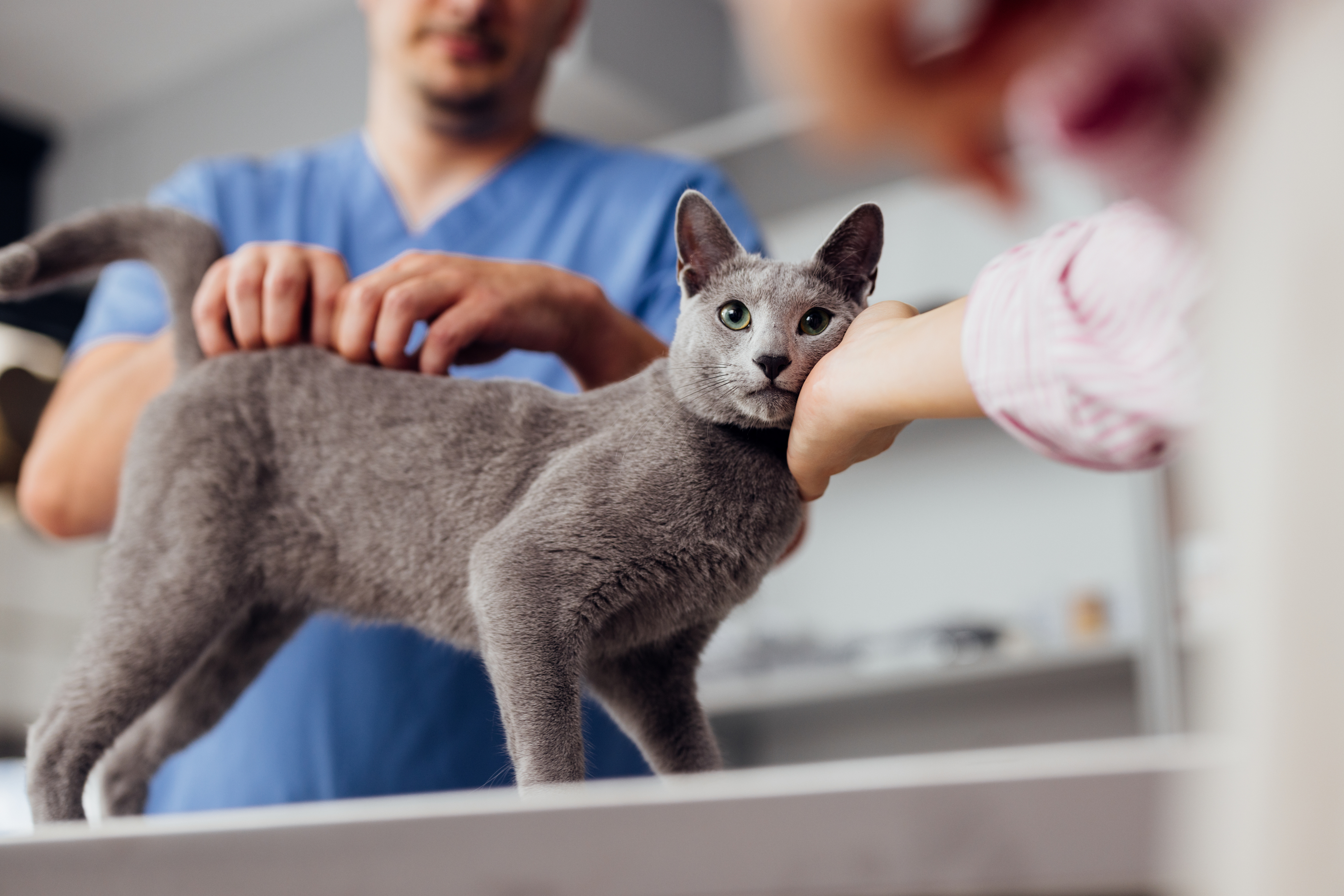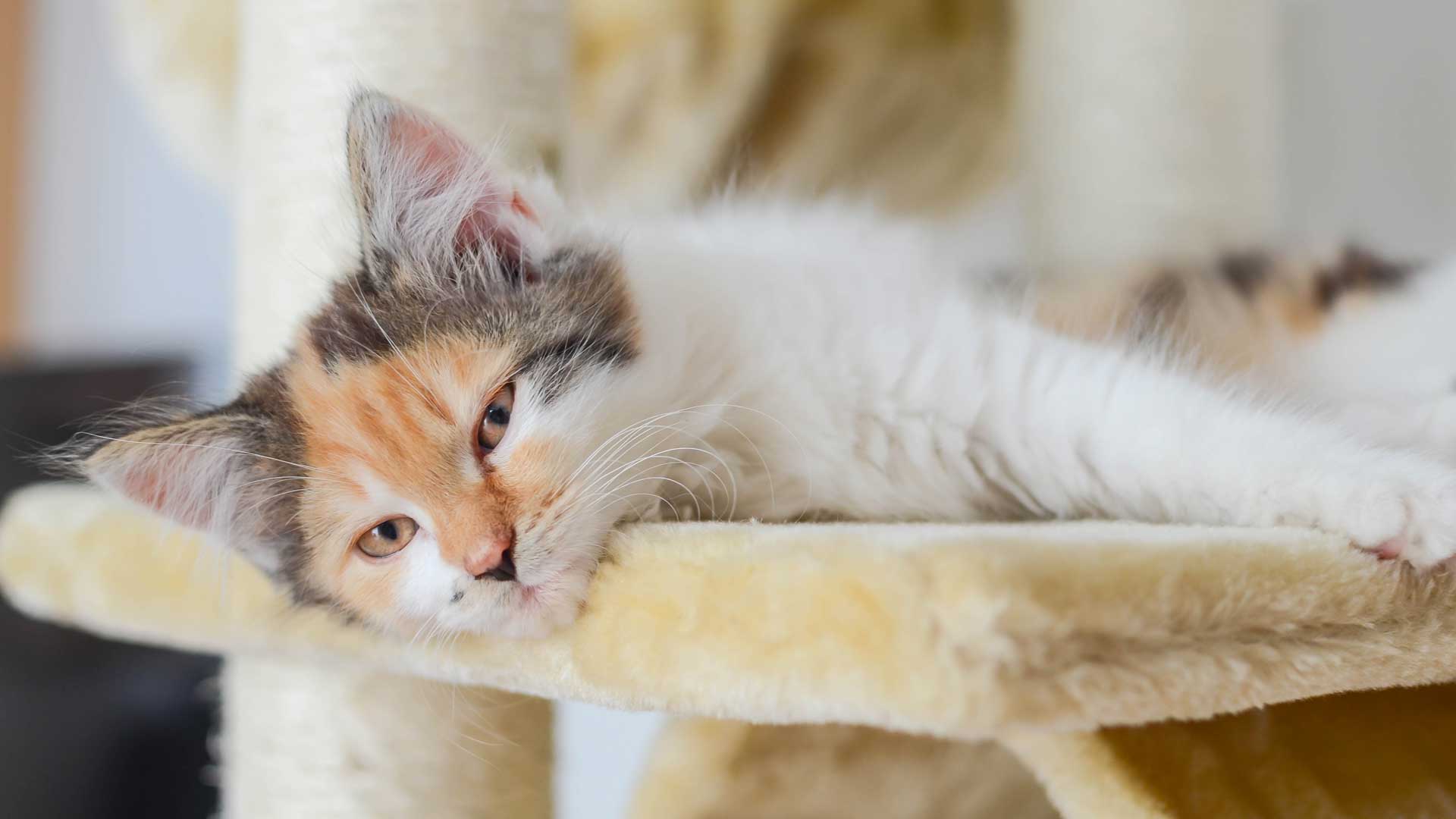vaccinations for cats: what every cat owner should know
Keeping your cat healthy starts with prevention, and vaccines play a big role in that. Whether your cat is a curious outdoor explorer or a cozy indoor companion, vaccinations help protect them from serious and contagious diseases at every age and stage. At Banfield, our veterinary care is personalized to fit your cat’s lifestyle. With convenient Optimum Wellness Plans®, it’s easier to keep your cat’s health on track. Ready to get started?
In this article
What are cat vaccinations and how do they work?
Why are cat vaccinations important?
Core and non-core vaccines for cats
Do indoor cats need vaccinations?
Kitten and cat vaccination schedules
Are cat vaccines safe?
How much do cat vaccinations cost?
What is a cat vaccination record and why it matters
FAQs for cat owners
Are you ready to protect your cat?
What are cat vaccinations and how do they work?
Cat vaccinations are a safe and effective way to help your cat’s immune system recognize and fight off certain diseases. Each vaccine contains a small, inactive or modified piece of a virus or bacteria that teaches your cat’s body how to respond without causing illness. This process helps build immunity, so if your cat is ever exposed to that disease in the future, their body is already prepared to fight it off quickly and effectively.
Vaccines are important because they don’t just protect individual cats. They also help prevent the spread of disease in the larger cat population. This is especially important for highly contagious illnesses like feline panleukopenia or respiratory infections, which can spread quickly in shelters, multi-cat homes, or communities. By staying up to date on vaccines, you’re helping protect your cat and reduce the risk of outbreaks that could put many pets at risk.

Why are cat vaccinations important?
Vaccinations are a key part of keeping your cat healthy and protected from serious, sometimes life-threatening diseases. They help prevent illnesses like rabies, feline distemper (panleukopenia), and upper respiratory infections, many of which are highly contagious and can spread quickly between cats. Some vaccines, like rabies, are also required by law in many areas to help protect both pets and people.
Even if your cat lives indoors, vaccines are still important. Indoor cats can be exposed to viruses through open windows, shared surfaces, or by humans tracking in germs on shoes and clothing. In multi-cat households or for cats who spend time outside, the risk of exposure increases, making vaccination even more essential.
Vaccines also help protect the broader cat population through something called herd immunity. When enough cats are vaccinated, it becomes much harder for diseases to spread, which helps protect kittens, senior cats, or pets with weakened immune systems. By staying current on your cat’s vaccines, you’re not only caring for your own pet, but you’re also contributing to a healthier, safer community for all cats.
Core and non-core vaccines for cats
Cat vaccines are divided into two categories: core and non-core. A cat’s age, health status, lifestyle, and environment all play a role in determining which vaccines they need. For example, outdoor cats or those who interact with other animals may need additional protection compared to indoor-only cats. Your veterinarian will consider all these factors to create a personalized vaccine plan that keeps your cat safe.
Core cat vaccines
Core vaccines are recommended for all cats because they protect against common, potentially severe or fatal diseases that are difficult to treat, hard to avoid, or may be contagious to us. These include the FVRCP vaccine (which guards against feline viral rhinotracheitis, calicivirus, and panleukopenia), rabies (which is required by law in many areas), and FeLV (feline leukemia virus), which is considered core for kittens due to their higher risk of fatal infection.
Non-core cat vaccines
Non-core vaccines are recommended based on a cat’s individual risk factors. Additional vaccines may be suggested for cats in high-risk environments like shelters, catteries, or multi-cat households.
Do indoor cats need vaccinations?
Yes, indoor cats still need core vaccinations, even if they never set foot outside. Diseases like rabies and those covered by the FVRCP vaccine (feline viral rhinotracheitis, calicivirus, and panleukopenia) can still pose a threat, and core vaccines help protect against these serious illnesses. In many places, the rabies vaccine is legally required, even for indoor-only cats.
While it’s easy to assume indoor cats aren’t at risk, unexpected situations can happen. Cats sometimes sneak out through open doors or windows or will hunt things that make their way inside. In addition, houseguests, other pets, or even a trip to the vet or a boarding facility can expose your cat to germs. Emergencies like natural disasters or accidents may also force your cat into unfamiliar environments.
The idea that “indoor-only means no risk” is a common myth. Vaccines help ensure that even if the unexpected happens, your cat is protected. It’s a simple step that offers long-term peace of mind.
Kitten and cat vaccination schedules
Kitten vaccinations
Getting your kitten on a vaccine schedule early helps them start off on the right paw. Most kittens start their first round of vaccines at six to eight weeks old, followed by boosters every three to four weeks until they’re about 16 weeks old. This series typically includes the FVRCP vaccine (feline viral rhinotracheitis, calicivirus, and panleukopenia), FeLV (feline leukemia virus), and rabies.
Cat vaccinations
Once the initial series is complete, adult cats need booster vaccines to maintain protection. Core vaccines like FVRCP and rabies are usually boosted at one year after the kitten series, then every one to three years depending on the vaccine type and your cat’s risk level. Cats with higher exposure, such as those who go outside or live with other animals, may need additional non-core vaccines or more frequent updates.

Older cat vaccinations
Senior cats and those with chronic health issues may follow a different plan. Your vet might adjust the schedule based on your cat’s age, medical history, or lifestyle to ensure they’re protected. If a booster has been missed or delayed, your veterinarian can help restart the schedule safely and effectively.
Every cat is different, so it’s important to follow a personalized vaccination plan made with your veterinarian. They’ll help you decide what’s needed and when, so your cat stays protected at every stage of life.
Are cat vaccines safe?
Yes, cat vaccines are generally safe, and most cats experience little to no side effects. When side effects do occur, they’re typically mild and temporary. These signs are normal and usually go away without any need for treatment.
- Sleepiness
- Soreness at the injection site
- Reduced appetite for a day or two
Serious reactions are rare, but it’s important to know what to look for. Call your veterinarian right away if your cat experiences any of the following. They could be signs of an allergic reaction that needs immediate care.
Signs to watch for:
- Vomiting
- Facial swelling
- Difficulty breathing
- Collapse within hours of receiving a vaccine

One condition cat owners may hear about is Feline Injection Site Sarcoma (FISS), a rare but serious type of tumor that can develop at the site of an injection. To reduce this risk, many veterinarians now use non-adjuvanted vaccines, which are formulated without certain additives that may trigger inflammation. At Banfield, we follow strict safety protocols to help minimize risks, including using high-quality vaccines and monitoring your cat after vaccination with comprehensive exams.
Your veterinary team can talk through any concerns and ensure your cat’s personalized vaccine plan is safe and effective.
How much do cat vaccinations cost?
The cost of cat vaccinations can vary based on your cat’s age, health, location, and the type of vaccines they need. On average, core vaccines like FVRCP and rabies typically cost between $20 and $50 each. Non-core vaccines may range from $30 to $70. Kittens often need a series of vaccines over several months, while adult cats usually require boosters less frequently, often every one to three years.
While upfront costs may vary, vaccines are a cost-effective way to help prevent serious illnesses that could lead to expensive treatments or emergency care. Banfield’s Optimum Wellness Plans® can help make preventive care more affordable by including vaccines, exams, and routine diagnostics for one monthly price.
To get a better idea of what vaccines might cost for your cat, enter your zip code below.

Get price estimate
What is a cat vaccination record and why it matters
A cat vaccination record is an official document that lists the types of vaccines your cat has received, along with the dates of administration, booster due dates, and proof that a licensed veterinarian gave the shots. It serves as your cat’s personal health passport, showing that they’re protected against key illnesses like rabies, feline distemper, and more.
You’ll often need this record when boarding your cat, traveling, renting a home, or during emergency vet visits. Some states and airlines also require up-to-date proof of rabies vaccination for legal or safety reasons. Keeping your cat’s vaccine history up to date helps ensure they can safely and easily access services when needed.
Banfield stores your pet’s vaccination records digitally so you can access them anytime through your MyBanfield account online or in the app. You’re always prepared, whether it’s for a vacation, a move, or an unexpected visit to the vet. Check out the Banfield app to help you easily keep track of your pet’s health.
FAQs for cat owners
What vaccines do cats need?
Most cats need core vaccines like FVRCP (feline viral rhinotracheitis, calicivirus, panleukopenia) and rabies. Kittens also typically receive the FeLV (feline leukemia) vaccine, and additional vaccines may be recommended based on lifestyle.
What is the FVRCP vaccine?
FVRCP is a combination vaccine that protects against feline viral rhinotracheitis, calicivirus, and panleukopenia, all of which are highly contagious and potentially serious. It’s considered a core vaccine for all cats.
What is the FeLV vaccine?
The FeLV vaccine helps protect against feline leukemia virus, a contagious and often fatal disease that weakens the immune system. It’s considered core for kittens, and it may be recommended for adult cats based on lifestyle and risk.
Do indoor cats need vaccines?
Yes, indoor cats still need core vaccines like rabies and FVRCP. Even indoor-only cats can be exposed to diseases through open windows, other pets, visitors, or emergencies.
What is the kitten vaccine schedule?
Kittens typically start vaccines at six to eight weeks old, with boosters every three to four weeks until around 16 weeks. This includes FVRCP, FeLV, and rabies (as required by law).
How long do cat vaccines last?
Most vaccines need a booster one year after the initial kitten series. After that, some vaccines last one year, while others — like rabies or FVRCP — may be effective for up to three years, depending on the type used.
What are typical vaccine side effects?
Mild side effects like sleepiness, soreness at the injection site, and temporary appetite loss are common and usually go away within a day or two. Most cats tolerate vaccines very well.
Can cat vaccines cause cancer?
In very rare cases, vaccines may be linked to a condition called vaccine-associated sarcoma, a type of cancer at the injection site. This is uncommon, and veterinarians take careful steps to reduce the risk.
What is a vaccine-associated sarcoma?
A vaccine-associated sarcoma (VAS) is a rare tumor that can develop at the site of an injection, including vaccines. To lower this risk, many vets use non-adjuvanted vaccines, administer the vaccine low on a limb, and monitor for abnormal masses.
Should I vaccinate my senior cat?
Yes, but your vet may adjust the schedule based on your senior cat’s health, lifestyle, and vaccine history. Staying up to date helps protect aging immune systems from preventable illness.
What happens if a booster is missed?
If a booster is missed, your cat may need to restart the series or receive an additional dose to restore full protection. Your vet can create a safe catch-up plan based on how much time has passed.
What is the difference between core and non-core vaccines?
Core vaccines are recommended for all cats and protect against common, serious diseases like rabies and FVRCP. Non-core vaccines — like FeLV, Bordetella, or Chlamydia felis — are given based on your cat’s lifestyle, age, and risk of exposure.
Are you ready to protect your cat?
Book your cat's vaccinations today. Find a Banfield vet near you
Published August 29, 2025
The information provided on this page is for informational purposes only and is not a substitute for professional veterinary advice. Always consult a veterinarian with any questions regarding your pet's health or medical condition. Never disregard or delay seeking professional veterinary advice based on information from this page.
 Mites and mange
Mites and mange Podcast - Not Just Fluff
Podcast - Not Just Fluff

